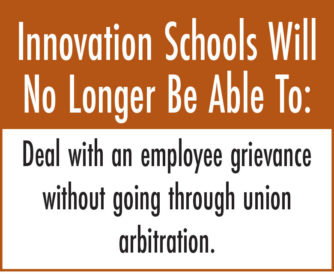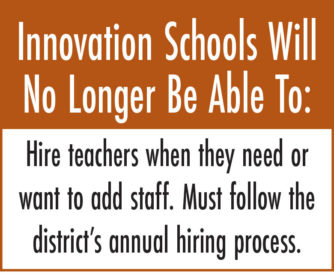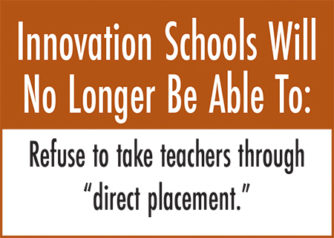Editor’s Note:
We recognized shortcomings in the prior version before our paper was distributed and moved quickly to post this revised and corrected version. We, Front Porch staff, believe this revised version of our May printed story on the new innovation schools policy now accurately presents the views of all interviewees. We apologize to readers, and we have apologized to the parties whose quotes weren’t accurately conveyed in the original article. We have taken steps to avoid such errors in the future.
In the interest of full disclosure, a former staff member who contributed significantly to our last three education articles used to be a member of the Northeast Denver Innovation Zone (NDIZ) board. We apologize that that was not disclosed along with the articles.
Denver school board members promised in March that a policy change—to standardize teacher rights across the district—would not dramatically alter progressive practices in the district’s 52 innovation schools.
Back in February, Board President, Xóchitl “Sochi” Gaytán said, “I know there’s been concern about how this could potentially limit innovative ways of being able to provide quality learning environments for students. That’s not what this is.”

In mid-April, a memo released by the Denver Public Schools Portfolio Management Team indicates otherwise. Rather than simply applying union contract processes, the new policy strips innovation schools of a dozen waivers tailored to their needs that they had won in plans previously approved by the district.
The portfolio office’s edict listed all practices that are “no longer flexible” under the new policy. Innovation leaders will NO longer be able to:
- Reject the direct placement of a teacher
- Create a school-specific calendar
- Reduce staff based on a school’s needs
- Set school-defined collaborative planning time for teachers or extend the school day with school-defined extra pay.
- Hire staff on annual contracts.
- Settle a grievance without arbitration.
- Recruit and make offers to applicants outside the district hiring timeline and set process.
- Determine extra compensation for extended time, additional responsibilities and incentives for teachers.
- Extend the school day for additional pay.
- Create a unique school governance model by defining the responsibilities and membership of school committees differently. For example, the ability to merge multiple committees into one group

“I feel like they lied to families and the community,” says Mary Seawell, senior vice president of education at the Gates Family Foundation, a strong supporter of innovation schools and zones. “They promised publicly that they would not take away flexibility from innovation schools to control their school calendars or a school’s ability to set the length of the school day, but in the district’s memo those are exactly the things schools can no longer control.”
Anne Rowe, chairwoman of the Northeast Denver Innovation Zone (NDIZ) community board, called the move disrespectful to the 52 innovation schools and three zones.
“The value of innovation is that it trusts the school leaders, educators and communities to best know how to serve their kids,’’ says Rowe. “This appears to strip much of that away.”
The significant consequences of the board’s decision leaves Rowe flummoxed. Direct placement of teachers is one that is especially misguided, she says.
“We’ve seen the impact of forced placement of teachers on schools, and historically it has resulted in a bad situation for the educator, the school and, most importantly, the students,’’ says Rowe who served on the DPS board from 2011-2019. “I find it remarkable we’re going back to that.”
“So much talent has been brought in because they can do this work this way,’’ says Rowe.
Rob Gould, president of the Denver Classroom Teachers Association (DCTA), said, “Innovative practices can exist alongside teacher’s rights. The whole idea that your kid is going to be stuck with a bad teacher is a misnomer. These are good, effective teachers as proven by the evaluation system.” He added, “Schools are protected through a provision in Senate Bill 191 which provides mutual consent between the teacher and principal. That’s what upsets me—that there’s still this negative bias towards teachers.”
Innovation schools have been allowed to combine some school committees such as the collaborative school committee and the school leadership team. Or to define committee responsibilities and membership in ways that work best for that school. The new policy takes that ability away.
Gould says, “Instead of principals appointing teachers to leadership teams, they’ll have to elect them, and they’ll have to make decisions by consensus. If they can’t make decisions by consensus, the principal will make the decision.” He notes that if a committee appeals a principal’s decision, it will go to the instructional superintendent who will consult with the DCTA (teacher’s union).

According to Bailey Holyfield, executive director of the Luminary Learning Network that oversees four innovation schools, “The most concerning thing happening here is that it seems both DPS and the superintendent have chosen to outsource their governance operating responsibilities to a third party labor organization (teachers’ union).
Rowe says the schools in the NDIZ zone will continue to push forward with their innovation plans even though the future looks uncertain.
Rowe also complimented board member Michelle Quattlebaum who represents northeast Denver for being open to work with NDIZ. “We are deeply appreciative of Michelle’s willingness to engage with us.”
The board’s new policy may face legal opposition because it appears to be in direct conflict with the 2008 Innovation Schools Act. That law says innovation plans must be approved by 60 percent of union members at a school and innovation status can only be revoked because of poor academic performance— not by a board’s order.
In response, state Sens. James Coleman and Chris Hansen have introduced a bill during the current session that would create a dispute resolution process between districts and innovation school zones that could create some clarity for resolving these kinds of issues.
Front Porch reached out to all board members to discuss the issue, but none responded. However, in late April, four members—a majority—requested a school-by-school inventory of how the new policy could negatively affect innovation schools. Requesting the review: Tay Anderson, Scott Esserman, Carrie Olson, Michelle Quattlebaum.
There are ten innovation schools in Northeast Denver: Swigert, Willow, Inspire, Isabella Bird, Ashley, Montclair School, Denver Discovery, Denver Green School—Northfield, McAuliffe International, and Northfield High School.
The board’s new policy is scheduled to take effect for most schools in June 2023.



0 Comments